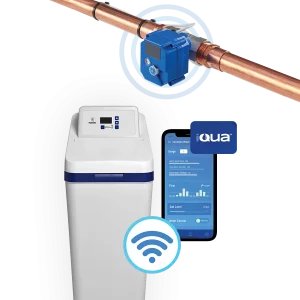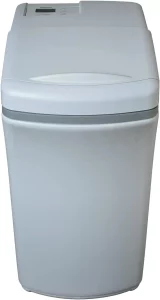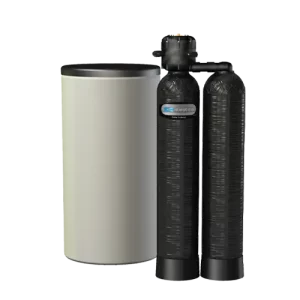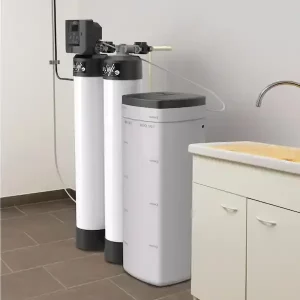Water softeners are essential appliances for households dealing with hard water issues. In this comprehensive guide, we explored various brands like AO Smith, Morton, Whirlpool, Kinetico, and Rainsoft.
This guide aims to provide extensive insights into their features, benefits, troubleshooting tips, costs, and comparisons, empowering you to make a well-informed decision for your home’s water quality needs.
Water Softeners: A Brief Overview
Hard water contains an excess of minerals, primarily calcium and magnesium, which can cause scaling and damage to plumbing fixtures and appliances. Water softeners use ion exchange technology to replace these minerals with sodium ions, effectively mitigating the adverse effects of hard water.
Top Brands and Their Offerings
1. AO Smith Water Softener:
Superior Quality and Efficiency
AO Smith water softeners are renowned for their reliability and efficiency in removing mineral content from water. Their advanced technology ensures reduced energy consumption during the softening process, making them an eco-friendly choice for households. Additionally, readily available parts make maintenance and repairs hassle-free.
Morton Water Softeners:
Reliable Performance with Solutions for Common Issues

Morton water softeners are known for their consistent performance. However, some users encounter issues like water overflow. Regular cleaning using Morton water softener cleaner is recommended to prevent such problems. While parts might be slightly harder to find in certain regions, troubleshooting and maintenance solutions are widely available online.
Whirlpool Water Softeners:
Accessibility and User-Friendly Features

Whirlpool water softeners are easily accessible through various retailers and online platforms. Their user-friendly features make installation and operation straightforward. Moreover, efficient customer support adds to the convenience of owning a Whirlpool system.
Kinetico Water Softeners:
Performance and High Cost

Kinetico water softeners stand out for their non-electric, twin-tank design, ensuring uninterrupted soft water supply. While their performance is exceptional, the higher initial cost might be a deterrent for budget-conscious consumers. However, the durability and effectiveness of these systems often justify the investment in the long run.
Rainsoft Water Softeners:
Advanced Features and Consideration of Value

Rainsoft water softeners offer advanced features and comprehensive water purification capabilities. However, their higher price tag may not align with everyone’s budget. It’s crucial to assess the added value these features bring before investing in a Rainsoft system.
Features and Benefits Comparison
Evaluating the key features and benefits of each brand can aid in making an informed decision:
- Regeneration Process: AO Smith and Kinetico utilize efficient regeneration methods, ensuring a consistent supply of softened water without interruptions.
- Capacity: Whirlpool offers various sizes to cater to different household needs, while Rainsoft systems not only soften water but also enhance its purity.
- Installation: Whirlpool and AO Smith typically have straightforward installation processes, making them beginner-friendly options for DIY enthusiasts.
- Warranty: AO Smith provides an extensive warranty period, offering consumers added assurance and peace of mind.
Cost Analysis
When considering the cost of water softeners, it’s essential to assess not only the initial purchase expense but also ongoing maintenance and operational costs. While AO Smith and Whirlpool might have lower upfront costs, systems like Kinetico and Rainsoft might require a higher initial investment. However, their efficiency and longevity might outweigh the initial expense over time.
Troubleshooting Common Issues
- Morton Water Softener Overflow: To prevent this issue, regular cleaning using Morton water softener cleaner is crucial. Proper maintenance and occasional inspection can avert such situations.
- Culligan Water Softener Reset: Resetting a Culligan water softener can usually be done by following the manufacturer’s guidelines or seeking professional assistance if needed.
- Aqua Systems Water Softener Reset: Similar to other models, resetting an Aqua Systems water softener can typically be achieved by referring to the user manual or contacting customer support for guidance.
Conclusion
Choosing the right water softener demands thorough consideration of various factors, including brand reputation, features, cost, and maintenance requirements. Each brand offers unique benefits, catering to different consumer preferences and budgets. It’s essential to prioritize your specific needs and preferences to make an informed choice that guarantees softened water and long-term convenience.
Frequently Asked Questions (FAQs)
Q1: How do I know if I need a water softener?
A: Signs of hard water include limescale buildup on faucets and appliances, dry skin or hair after showering, and difficulty lathering soap. Additionally, if your water tastes or smells unusual, it might be time to consider a water softener.
Q2: What size water softener do I need for my home?
A: Determining the right size involves considering the water hardness level and daily water usage. A professional water test can accurately measure hardness, while estimating daily usage helps select an appropriately sized unit.
Q3: How often should I add salt to my water softener?
A: The frequency of adding salt depends on the softener’s size, regeneration cycle, and water usage. Typically, it’s advisable to add salt once every few weeks to maintain optimal performance.
Q4: Can I install a water softener myself?
A: Many water softeners come with DIY installation guides. However, if you’re uncertain or uncomfortable with the process, it’s best to hire a professional to ensure proper installation and avoid any complications.
Q5: Are there alternatives to salt-based water softeners?
A: Yes, alternatives like electronic water descalers and template-assisted crystallization (TAC) systems exist. These options aim to reduce scaling without using salt but may vary in effectiveness based on water hardness levels and specific household needs.
Q6: How long do water softeners last?
A: The lifespan of a water softener varies depending on brand, usage, maintenance, and water quality. On average, well-maintained systems can last between 10 to 15 years, though some high-quality units can surpass this timeframe.
Q7: Can a water softener make water too soft?
A: While water softeners effectively remove hardness minerals, excessively soft water (very low mineral content) might not be desirable for drinking due to its flat taste. Many systems offer settings to adjust the level of softening to suit individual preferences.
Q8: How do I maintain my water softener?
A: Regular maintenance includes adding salt when needed, cleaning the brine tank, checking for salt bridging, and occasionally cleaning the resin tank. Following the manufacturer’s maintenance guidelines ensures optimal performance.

1 thought on “The Ultimate Guide to Choosing the Best Water Softener for Your Home”
Comments are closed.